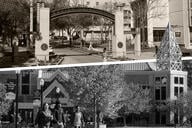You have /5 articles left.
Sign up for a free account or log in.
In 2006, Eastern Mennonite University cracked a list of top colleges for “conservatives, old-fashioned liberals, and people of faith.” It was a dubious distinction. The Virginia university, coming out of a pacifist tradition, names “peace and sustainability” as core values.
“Many of the colleges, not all, but many of the colleges in that publication would have a rather different stance than we might have on a number of current issues,” Loren Swartzendruber, president of Eastern Mennonite, says of the listing. “It did spark for us this continuing conversation about how we position ourselves and what those terms mean in the public domain.”
“The growth of the right-wing Christian population in this country, or should I say, at least the visibility of the right-wing – which gets attached to 'Christian' in the minds of people – creates a disconnect for us. Because we are clearly Christian. We have no intention of giving up that identity. But we are, I think, a different kind of Christian.”
Swartzendruber describes an internal discussion at Eastern Mennonite on whether to brand the university as a “socially progressive” Christian college -- the emphasis, he says, being on a deep Christian commitment to social justice issues (some of which might be described as "liberal" in contemporary parlance).
“It’s a truth in advertising kind of thing,” he says. “If [students] assume they’re going to find at EMU what they would also find at Liberty University [the nearby institution founded by the Rev. Jerry Falwell] they’re not going to be very happy here. They’re going to run into it headlong. They’re going to hear about the peace tradition. They’re going to hear a lot of language about what it means to be a follower of Jesus in this world. From our perspective, that means less nationalism, and a much more global perspective, care for creation. What they would find here is a concern for personal piety … but we’re not willing to stop there because we also believe that the New Testament is pretty clear that there is a social dimension to what Jesus called us to be and to do.”
The university attracts students from all over the world, including Israel and Palestine, to its hallmark graduate program on conflict transformation, runs a Summer Peacebuilding Institute, and characterizes its green building practices as outgrowths of Mennonite theology.
On the flip side, Swartzendruber continues, “To say that we’re socially progressive to some people raises red flags.” The college’s primary constituency, the Mennonite church – about half of its undergraduates are Mennonite – is “all over the map politically.” Furthermore, Swartzendruber says, “any one or two words do not fully communicate. People ask me if I’m conservative or liberal. Well, I don’t know. We have to talk about specific issues.”
Eastern Mennonite is, after all, socially conservative in some ways. Alcohol is banned on campus. Students sign on "to refrain from sexual relationships outside of marriage.” The language of the "community lifestyle commitment" grows out of the theological positions of the Mennonite Church, Swartzendruber explains, which maintains that sexual relationships are reserved for man and woman in marriage.
“These terms play differently to different constituencies,” Swartzendruber says of the “socially progressive” tagline. “We know there are students out there who probably aren’t Mennonite, but they may be uncomfortable with what they see as the predominant Christian culture in this country and they want something different."
“We’re trying to figure out a way to reach these students.”
Political Baggage
Eastern Mennonite’s deliberations reflect larger challenges confronting a subset of religious colleges: Those looking to differentiate themselves from what’s perceived as the prevailing norm – Christian colleges as bastions of social conservatism – without collapsing age-old faith traditions neatly into simplistic, politically constructed (and potentially alienating) boxes.
“When I think about branding or how we would present ourselves, I go back to our core values, our five core values,” says James E. Brenneman, president of Goshen College, another Mennonite institution, in Indiana. Goshen's core values fall under the headings of “Christ-centered,” “passionate learners,” “servant leaders,” “compassionate peacemakers,” and “global citizens.”
“I try, personally, to not speak of left, right or center, or liberal or conservative or Republican or Democrat or blue and red, and rather think of it as almost a third way of thinking,” Brenneman says.
"I think the world 'progressive' now has taken on the connotation of liberal and all that means. Well, how does that work if we believe that to be Christ-followers and compassionate peacemakers, that part of peacemaking is being consistently pro-life all the way across the board from life to death? We’re against the death penalty but we also might prefer that abortions don’t happen.”
"Sometimes labels are less than helpful, especially when you're trying to promote your school and those labels -- they carry so much baggage with them."
“We see ourselves more as a centrist place,” says Kim S. Phipps, president of Messiah College, in Pennsylvania. The Christian college, born from the Anabaptist, Pietist and Wesleyan traditions, recently faced criticisms from the right and left when in April it hosted the then-Democratic presidential contenders on campus for the “Compassion Forum," intended as a setting for discussions on issues including AIDS, climate change, genocide, human rights and poverty.
The right criticized a Christian college for hosting pro-choice candidates. The left criticized candidates for appearing at a college where the "community covenant" requires the avoidance of “sinful practices” including “drunkenness,” “sexual intercourse outside of marriage,” and “homosexual behavior.”
“It’s a balancing act. Faith is beyond political party and political alliances,” says Phipps. In brainstorming a new branding campaign, she's trying to stay away from language that could identify Messiah with either the left or right side of the political spectrum. The college is currently using phrases like “gracious Christianity” and “hospitality,” although, she acknowledges, “We’re probably going to need to find some language beyond those words that resonate more.”
Social Conservatism
“The effort to employ the Christian college as a progenitor of politically and socially progressive values has had about as much success as broader efforts on the part of many, including myself, to broaden the political and social vision of evangelical Christians more generally,” David P. Gushee, professor of Christian ethics at Mercer University, writes in a chapter of the 2006 book, The Future of Baptist Higher Education (Baylor University Press). “Put directly, it is hard to get red-state, red-meat evangelicals to warm to the idea of their colleges as centers of criticism of American capitalism, consumerism, nationalism, and militarism. Evangelicals tend toward social conservatism, not progressivism and certainly not radicalism, though they do remain open to at least some aspects of the progressive vision when it is presented persuasively, on biblical grounds, by people whom they trust.”
He writes later in the chapter that Christian colleges with seemingly progressive social agendas "tend to be found in the kinds of faith traditions whose piety organically generates such moral commitments, rather than having such a vision imposed on them for a time by a cadre of influential faculty members or administrators." He cites as an example Berea College, a non-denominational Christian college in Kentucky. It's a no-tuition institution that only serves low-income students.
In an interview, however, Gushee says he believes that as evangelicals move more to the center, politically speaking – a phenomenon he describes in his new book, The Future of Faith in American Politics (Baylor, 2008) – more religious colleges will start to describe themselves as evangelical and progressive.
Currently among the Baptist colleges -- strongholds of social conservatism -- Donald Schmeltekopf, provost emeritus of Baylor University, in Texas, and co-editor of the book on Baptist higher education, says he’s not seeing much evidence in the way of social progressivism.
“In the Baptist tradition, there isn’t an emphasis in the way that you have in some Catholic and Mennonite traditions on peace and justice issues,” he explains. There is a “growing sense,” he continues, “that we have been neglectful of our obligations as Christians to speak out on issues of peace and justice. I think that is going to be a more prominent storyline, so to speak, or a more prominent narrative in the years ahead.”
“But it is not,” Schmeltekopf says, “embodied in institutional life.”
“Christian college students and institutions should be more empowered to act on social issues than, frankly, many of our secular peers because our faith demands it of us,” says Nate Mouttet, vice president for communications at the Council for Christian Colleges and Universities.
“I can speak confidently by saying all of our campuses are going to be engaged on social issues, because, again, the Christian faith asks that of them. Some of our campuses are going to be acting on social issues that may be perceived as actually progressive or liberal" because their faith traditions, Mouttet says, take them in that direction.
Social Justice, in a Catholic Context
And then there are the Roman Catholic colleges, where there’s a split between the more theologically conservative colleges – which have, particularly in recent years, tried to corner the market on “Catholic identity” – and, well, everyone else.
Many of the more mainstream Catholic universities – particularly the Jesuit colleges – have responded to attacks on their Catholic character in part by emphasizing a strong commitment to social justice. These are institutions where officials hate that their public identity is formed by debates over "The Vagina Monologues" when students are involved in prisoner rehabilitation programs (as is the case at University of San Francisco), or raising awareness of poverty in the United States (such as in this Spring Hill College "Facing Poverty" project), or traveling to Central America to do the same.
“Social justice has really been a hallmark of the Vatican and the leadership of the church for almost 30 years now, since John Paul [II] became Pope," says the Rev. Michael J. Garanzini, president of Loyola University Chicago. “Our congregations have been stressing the whole notion of justice and faith, and a faith that does justice.”
“The Jesuit schools have, especially over the past 10 years, been taking that message pretty seriously,” Father Garanzini says. “How will our education prepare men and women to be promoters of social justice?"
“You would almost say, from the outside, that there are juxtapositions of the social justice agenda – which is thought of as a liberal agenda – with the Pope’s own conservative theological agenda.” Some Catholic colleges, Father Garanzini says, are “hitching their wagon” to the latter, and others to the former.
Meanwhile, at DePaul University, another Catholic university in Chicago (but with Vincentian roots), officials say they describe the university's social agenda with more neutral terms like "community involvement, service learning, service to the community." They say they aren't overly explicit in promoting social justice as an ideal to prospective undergraduates, who grow to understand it only through experience.
"What we find is that the commitment to social justice, the learning that's really infused with the social justice message, with community involvement, is that's something they get and come to appreciate through their undergraduate career and certainly something that they play back very strongly as alumni," says Deborah Maue, DePaul's assistant vice president for marketing strategy.
"But it's not something that we lead with."




